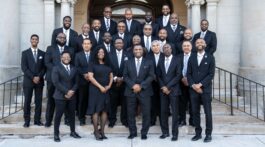Legalism, or the notion that right-doing will gain you salvation, is both taught and drawn out by the environments in which we develop. Christianity has plenty to teach about how we should live, but unfortunately, those teachings on obedience oftentimes devolve into simplistic legalist rant.
We as a community suffer when we do associate legalism and obedience together.
I still tend to associate Christian obedience with “don’t watch bad movies, don’t cuss, don’t have premarital sex, and don’t do drugs or drink alcohol.” This is problematic not because the commands themselves are wrong, but because those behavioral standards are simply symptoms of larger heart issues that are left unaddressed. Even if some successfully avoid bad behaviors, their naiveté does not alone bring them closer to Christ. It took a long time for me to find people who would teach me that the pursuit of innocence is not the same as the pursuit of holiness.
These “heart issues” may vary, but I think that there are two core problems in the disciple’s heart: an inability to cope with suffering and a tendency to celebrate selfishly.
I’m going to focus on the disciple’s tendency to celebrate selfishly.
The other day I went to a meeting in a big fancy room at my workplace where they were discussing the different eating habits of the four main consumer segments of our pastries and snacks. One of the consumer segments especially caught my attention.
“This type of consumer likes to consume our product as a way to reward a healthy meal. It’s usually a mom who sees our snack cake as the family’s cheat after a nutritious meal.”
The consumer report continued on to discuss in more detail the habits and purchasing behaviors of this particular consumer. There were even real-life examples of people who fit the mold for the consumer. They talked about balance and temperance in all things.
It made me think of my spirituality that often becomes snack cake Christianity during stretches of success. We are all familiar with the depressed binge-eater, but what about the I-earned-this comelones?
Snack-cake-as-a-reward consumers are aware they are feeding their family something rich to the taste, but scarce to the health. In fact—that’s the point for why they eat the sweet desserts. The line of thinking is straightforward: we just had a healthy moment and now we get to have a tasty moment
Snack-cake Christianity reasons similarly. After a day or two (or three!) of arduous “right-living,” it reaches for the indulgence.
I have lived well for a few days, it reasons, it’s time to indulge in my “self-medication.”
Perhaps it’s porn, alcohol, movies, Internet arguments, food, church life, work, sports—or whatever it is that brings quick pleasure where Christ would provide the healthiest avenues of celebration.
For me, it’s often been pornography and at times it has been work or church life. It comes at the tail-end of healthful choices when my mood is positive and my morale is up. Suffering like a Christian does not present the most difficult challenges to practicing my faith. In fact, suffering or grieving with the Lord comes quite naturally, but celebrating as a Christian?
That’s hard.
And so that is where we get back to that unpopular notion of Christian obedience in all things. We can see that when it comes to celebrating, the natural instinct is to let all inhibitions go and simply “have a good time.” Drake coined the motto “YOLO” several years ago, and although its usage is only ironic now, the belief that my-successes-earn-me-the-right-to-celebrate-in-whatever-way-I-please is timeless.
And it’s self-centered. It compartmentalizes out of our lives the Lord who would be with us in illness and in wellness.
If we are talking about pastries after a meal, it may be tolerable.
But when it comes to the larger attitude that justifies our self-driven choices on Friday night or Saturday night because we were good students/workers/etc. during the week and showed up to church with our #sabbathswagg for the Lord, then we have major issues.
God calls us to healthy living and that includes celebrating within the parameters of obedience. It’s not about the don’t have sex or don’t drink alcohol; it’s about the intimacy and connection that comes from turning to God and asking Him, so how should we celebrate this weekend?
We would not look at a spouse and say hey, we have had a great two-year run of happiness and faithfulness, but I really want to go have an affair, don’t you think I earned this?
Neither should we make the equivalent statements to our Lord.
Recently, a new anthem has sounded that sounds very different from the Drake #YOLO. Last year, Chance the Rapper released an album that was both an imaginative exploration of what his very Christian grandmother’s would say to him if she were still alive and an unmitigated session of praises to the Lord.
In an album full of gospel-influenced songs, one of the rapper’s hook goes: when the blessings come down, the praises go up.
That lyric reminds me of Psalm 103, a poem committed to praising the Lord. In that psalm, the author writes, “who satisfies you with good so that your youth is renewed like the eagle’s” (v.5).
Have you ever noticed how much it wears people down to celebrate wholly committed to self-satisfaction and without restraints?
The crazy truth about Christian celebration is that God promises to give us more pleasures and successes that will not corrode our senses, but rather, they will renew them.
So instead of spending ourselves to have a moment of celebration, Christians spend themselves celebrating and praising their God whose blessings shower down in an ever more astounding manner.
There are no cheat moments; our God invites us into a satisfying eternity.










